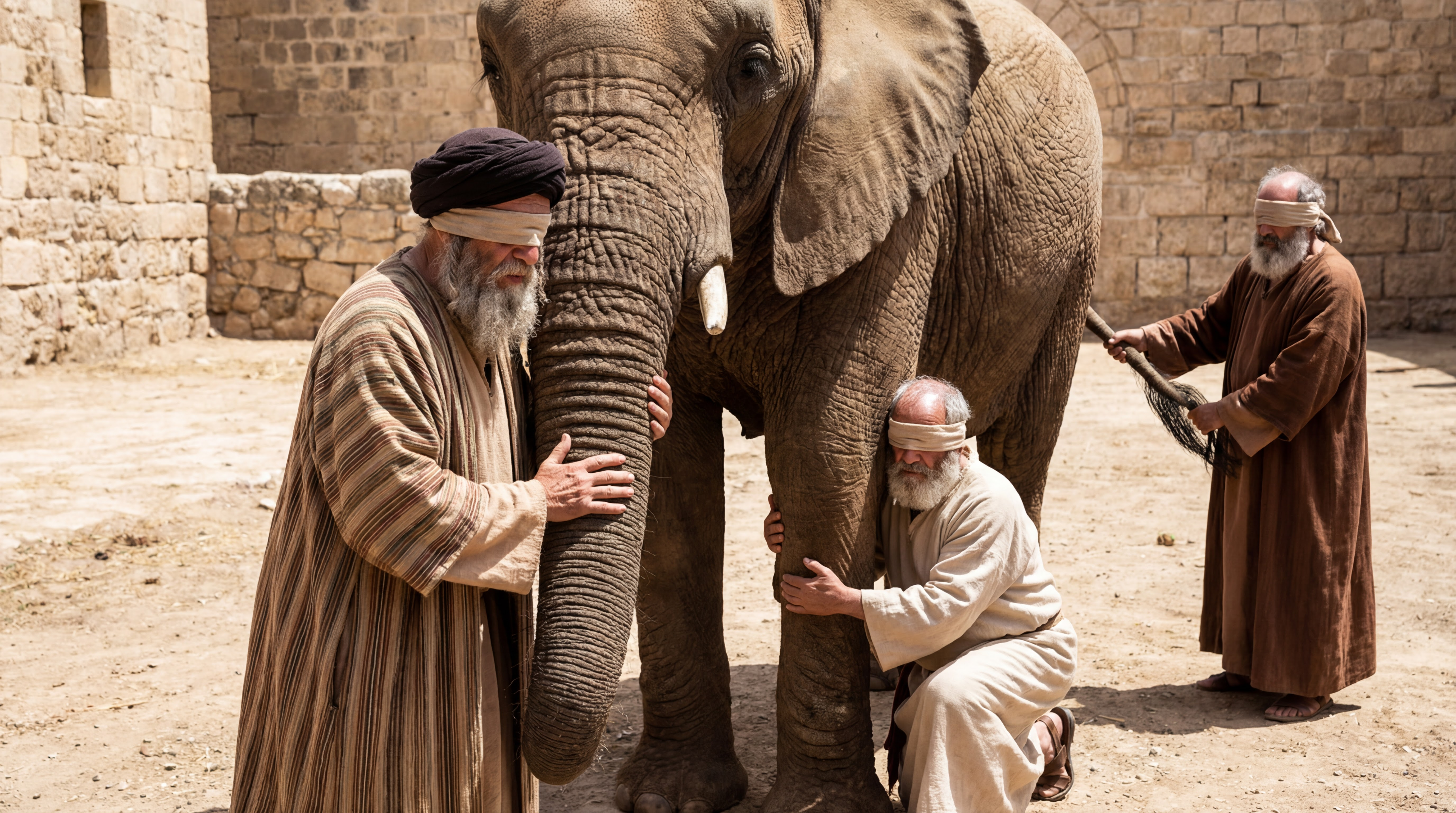Seven Useless Definitions of Holiness
Thoughts on What Holiness Is—and Isn’t

An old story tells of blind men feeling an elephant. One takes the trunk in his hands: “Elephants are like snakes.” Another hugs the leg: “No—elephants are like trees.” A third clutches the tail: “You’re both wrong—elephants are like stiff rope, frayed at the end.”
Holiness gets the same treatment. Everyone has a piece of the puzzle and swears it’s the whole picture. But God’s holiness is far bigger, wilder, and more beautiful than any of us can imagine. And most of what passes for a definition is just a fragment—partly true, and subtly misleading.
Why does it matter? Because we’re called to be holy as He is holy.
If we don’t even know what holiness is (or worse, cannot know what it is), we can spend our whole lives chasing shadows.
Each touches the truth—but only a fragment. They describe holiness by its shadows, not its source. So before we talk about what holiness is, let’s clear away what it isn’t—especially the versions we’ve baptized and built our religion around.
"Holiness is sin avoidance."
Defining holiness as “not sinning” makes God sound like a cosmic hall monitor.
It’s like defining light as “not dark”—technically true, spiritually empty.
We’ve all been there—counting sins like calories, convinced holiness means staying spiritually thin. You end up policing yourself instead of loving God, shrinking your life down to what you must not do instead of what you were made for.
God was holy before sin entered the picture. His holiness isn’t a fear of defilement; it’s a radiance of perfect life that fills instead of forbids.
"Holiness is separation from the world."
If holiness means hiding from sinners, Jesus failed miserably. He didn’t avoid the world—He healed it from the inside.
Withdrawal masquerading as holiness builds bunkers and calls them temples. We’ve all seen it—the prayer group that never meets the people they pray for, the family table that never stretches for a neighbor, the church known for how they picket instead of Whom they preach. We mistake comfort for conviction and call it purity.
True holiness doesn’t lock the front gate; it lights the front porch.
"Holiness is separation to God."
“Set apart to God” sounds right—until we use it to paint holiness as distance. We talk about being “set apart” unto God, but sometimes that is just code for “set aside”—too sacred to serve, too spiritual to care.
And it still doesn’t make sense when applied to God, because God isn’t “set apart” from something greater. He is the standard, the source, the center. His holiness isn’t self-isolation; it’s relational overflow—the fullness of His life, perfectly Himself, perfectly good.
Real holiness is union so deep that His life spills through us into everything we touch.
"Holiness is moral perfection."
If holiness means flawless behavior, we’re sunk before breakfast. Even then, perfection as we like to define it is usually a far cry from how the scriptures use it, because God's word would force us to scrap the lie that "Nobody is Perfect."
Scripture’s “Be perfect” doesn’t mean “never mess up”; it means “be complete” (teleios), and it's a real perfection actually applied to real humans throughout the Bible, like Noah, Job, Paul, Elizabeth, and Zechariah—none of whom were morally flawless.
We tend to keep moral scorecards like Pharisees with Fitbits: always tracking, never resting. Performance replaces peace, and we end up exhausted rather than transformed. True holiness isn’t flawlessness; it’s wholeness restored—a life integrated, not inspected.
"Holiness is righteousness."
Though deeply connected, these are not the same things. If righteousness is the straightness of the road, holiness is the brilliance of the destination. We settle for driving the speed limit and call it devotion, forgetting where the road is supposed to lead.
God’s justice shows what is right; His holiness shows why it is beautiful.
Holiness isn’t about staying in the lines; it’s about being lit by the destination’s glory.
"Holiness is godliness."
Let’s be honest: saying holiness means “godliness” is like calling water wet—true but useless. We say “godly” when we mean polite, predictable, and properly dressed for church. God isn’t just “godly”; He’s whole. And holiness begins when His life, not our manners, defines us.
"Holiness means worthy of devotion."
Yes—God is worthy of devotion. But holiness isn’t a competition for worship. Angels are also holy, yet we don’t worship them; their brightness is meant to reflect, not replace.
And when people do worship angels—or chase “angels of light”—it proves the point: radiance can pull the heart toward devotion even when it isn’t God. Holiness evokes awe not because it is merely aesthetic, but because it is other—a distinct, moral purity that feels like weight, like reality, like clean fire.
Holiness draws our hearts upward, not by force, but by wonder.
To Summarize
Holiness is like the elephant—far bigger than the little piece you’re holding.
These definitions skim the surface but miss the glory. You can spend your life reciting them and never glimpse the wonder of a truly holy God.
The real thing isn’t about escaping sin but embodying life. Holiness isn’t a subtraction—it is overflowing wholeness.
And that overflow was never meant to stay in heaven. When God says, “Be holy as I am holy,” He isn’t mocking our weakness—He’s revealing our design. Whatever holiness is, it must fit human skin, because the Holy Word became flesh, and even the frail and flawed have been called holy men and women of God.
Holiness must be something we can actually share in—or the command becomes a riddle and the label becomes hollow: a way to sound redeemed while staying unchanged. Saints and prophets weren’t exceptions; they were previews of what His wholeness looks like in human form.
Let’s pull the curtain back on what holiness really is—the kind that overflows, heals, and makes the world whole again:
So... What Is Holiness?